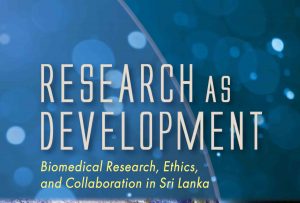At one end of the spectrum of local concerns for the need for bioethics lie prosaic concerns about the protection of vulnerable subjects and the belief that the discipline of bioethics can provide some leverage on this issue. For example, the recruitment of local participants to international clinical trials has produced a range of justifications, rationales, excuses, explanations, and accusations of exploitation and has on occasion resulted in trials being closed down because of concerns about their actual or potential harm to the participants. The IRD has been vociferous in raising such concerns and has drawn on bioethics as a way of highlighting exploitation while at the same time promoting local scientific research as integral to development in Sri Lanka.
At the other end of the spectrum, however, is a rhetoric of bioethics that addresses the novel technologies that are arriving in Sri Lanka. In addition to international clinical trials, these technologies include transplant surgery, gene technology, and assisted reproductive technologies, all of which raise questions about the limits of medical intervention as well as issues of access and equality. These biomedical and technological advancements create another conduit for particular kinds of bioethics discourses to enter into Sri Lanka. Local doctors and scientists want to show that they are progressive not only in science but also in the ethics by which the science is evaluated and governed. Having ethics expertise in place plays an important role in demonstrating to international audiences that Sri Lanka is on a par with most recent developments elsewhere. Here, ethics has the role of both facilitating possible future research and operating as a mode of protection. Where external audiences are concerned, there is anxiety that charges of ethical laxity or deficiency might be indexed to estimations of national development and scientific credibility.
All these activities, although local in their implementation, are underpinned by international funding. They also involve a great deal of movement of personnel into and out of the country for training and dissemination events, and they result in publications in international medical journals (e.g. Dissanayake, Mendis, and Lanerolle 2006; Sumathipala et al. 2003; Sumathipala, Siribaddana, and Patel 2004). In short, capacity building in bioethics is not simply a context that is created to receive new kinds of knowledge and expertise; it is thoroughly enmeshed in international exchanges (Simpson et al. 2015). The complexities that underline the apparently simple objective of “capacity building” are further evident in the emergence of diverging lines of argument among different interlocutors in the discourses around bioethics in Sri Lanka.
Chapter 8
Strategic Ethics
Pages 144 to 149
A Regional Collaborative Workshop
To bring these critical voices into play, let us return to the event with which we began this book: the Regional Collaborative Workshop held at the University of Colombo, which posed the question “Why Should We Be Concerned about the Ethics of International Collaboration?” Invitations were widely distributed before the event via a number of regional mailing lists, and the responses were very positive. It appeared that, in many quarters, such an event was seen as both timely and important. The ethics of international science collaborations were clearly of considerable interest.
…
The chair of the Ethics Committee’s opening statement at the workshop brought attention to the assumption that biomedical research as a route to development does not automatically mean progress. As suggested by the images he showed concerning the fate of collaborators in France during World War II, collaboration brings cool as well as warm themes. We now explore the potentially adverse consequences of international collaboration by looking at three bioethical controversies that unfolded in Sri Lanka over the period of our fieldwork. These controversies provide a lens through which to view the tensions that occur around the practice of international collaborative research. How people positioned themselves in these disputes revealed the different and often conflicted kinds of investments at work in the business of conducting clinical trials.
…
Postcolonial Critiques
During the workshop, a representative from the Institute for Research and Development in Sri Lanka confronted the chair of the Ethics Committee. The exchange took place after the chair had talked about the ambiguous nature of collaboration. The specific critism focused on events that followed the 2004 tsunami that swept over several coastal countries in the Asia-Pacific region on Boxing Day. At the time, a flurry of humanitarian aid organizations had introduced research and rehabilitation programs in Sri Lanka without sufficient standards for doing research under such circumstances. As noted by several anthropologists who have studied disasters and humanitarian aid (e.g., Fassin 2012; Pfeiffer 2003; E. Simpson 2014; Ticktin 2006), when a crisis sets in motion activity that is ostensibly about relief and assistance, it simultaneously generates a reality of its own – during the commotion, other things can happen. In 2004 a Japanese collaboration had conducted research in Sri Lanka and had taken samples from people in order to study post-traumatic stress disorder.
In this instance, the allegation was that the study of post-traumatic stress disorder was both opportunistic and extractive: the traumatized individuals who had been displaced by the flood provided blood samples to foreign researchers without any clear indication of why or to what end. In the wake of the disaster, these people were far too vulnerable to be included in research, yet the samples were collected and shipped out of the country. Their removal raised further concerns about illegal appropriation of samples and “biopiracy.” Finally, came the most serious allegation: the collection of samples from vulnerable people would not have happened were it not for the questionable ethics clearance that had been given. The approval, it was alleged, was invalid as it was given post hoc; moreover, it was nepotistic as there was a family connection between one of the researchers and a member of ethics committee. These views expressed from the floor were part of the wider critique of international research collaborations (e.g., Sumathipala 2006), which have pointed to some as the development of iatrogenic medicine.
…
The Institute for Research and Development (IRD), which the speaker from the floor represented, is an independent research organization. The events surrounding the tsunami had led members of the IRD to produce a corpus of materials regarding mental health research (Allden et al. 2009; Ekanayake et al. 2013), disaster management (Siriwardhana et al. 2012; Sumathipala, Jafarey, et al. 2010), and bioethics (Sumathipala 2006; Sumathipala, Siribaddana, et al. 2010). They drafted guidelines for research activity that takes place during or after a disaster (Sumathipala, Jafarey et al. 2010; Sumathipala, Siribaddana, and Patel 2004). For their bioethics work, te group was funded by the Wellcome Trust, and they published several articles on the skills and views of ethics committee members (Sumathipala et al. 2008) as well as research participants’ understanding of informed consent and their role as research subjects (Sumathipala, Siribaddana, et al. 2010). In contexts where scientific literacy is low and trust in doctors is high among the research participants, Sumathipala and Siribaddana also suggested the value of a research ombudsman, whose role it would be to ascertain whether consent was freely given, autonomous, and without therapeutic misconception in contested cases (Sumathipala and Siribaddana 2004; also see Simpson 2005). This move would, in effect, introduce people to watch over the people watching over.
The notions of research governance that IRD members put forward mirror the organization’s advocacy for social justice and progressive change in Sri Lanka. Their particular interests is in the role of science, research, and development in reaching these objectives. As their website at the time of our research stated, one of their aims is “to create a new strategic alliance among academics, scholars, professionals, and the public to build a new research culture in Sri Lanka, so that the power of knowledge in science & technology could be mobilized to address the problems of the society using an evidence based approach, which in turn is crucial for the sustainable development of the country” (Institute for Research and Development 2014). Not surprisingly, international collaboration in the form of “strategic partnerships” is an area of great interest and concern for the IRD. Research is seen as welcome when it can be harnessed to the needs of the society and its people; research according to this definition ought to produce development in the classic sense. The organization is critical when they see research as extractive, harmful, and serving the interests of Western – or indeed local – elites.
Their stance is not antiscience or anti-Western per se but rather a continual questioning of whether knowledge has application and value locally. The word ‘locally’ here references far more than the local community – it extends to the user-beneficiaries of the knowledge produced. Their disaster management guidelines make this view explicit: “More stringent policies have to be followed to prevent unethical data collection and exploitation of disaster survivors giving due attention to issues such as a) what types of research, b) how soon, c) if based on local needs and priorities and d) complexities when combined with aid and clinical care” (Sumathipala, Jafarey, et al. 2010, 128). In this view, research carried out under circumstances of emergency is not denied outright, but it should only be done within stringent frameworks and with careful consideration of the needs of those whose very predicament is what renders them of scientific interest.
Research, when conducted for needs that are scientific rather than applied, and distant rather than local, is brought into question because it might be exploitative and potentially harmful. This is reflected in the IRD’s disaster guidelines:
In the long-term disaster period, the IRD experienced the influx of foreign academics and researchers intent on conducting various researchers on these Tsunami-affected populations and saw how beneficial and detrimental these can be on the local populations. Many of the researchers were from the developed world and their research agendas and interventions based on the western perspective which acted negatively on the local vulnerable populations. (Sumathipala, Jafarey, et al. 2010, 125)
From this perspective, local researchers are seen as those best able to gauge the needs of local people and how those needs might be best served by research. International collaborations and researchers are seen to promote foreign interests and cause local harms. The work of foreigners, even when they work with local researchers, may not bring benefits to “local people.” This argument is one that promotes a particular vision of research culture in which research is not in itself problematic unless it is a neocolonial, top-down exercise that furthers foreign research interests.
Reference
Sariola, S., & Simpson, B. (2019). Research as Development: Biomedical Research, Ethics, and Collaboration in Sri Lanka. Ithaca; London: Cornell University Press. Retrieved from https://www.jstor.org/stable/10.7591/j.ctv2867cw

